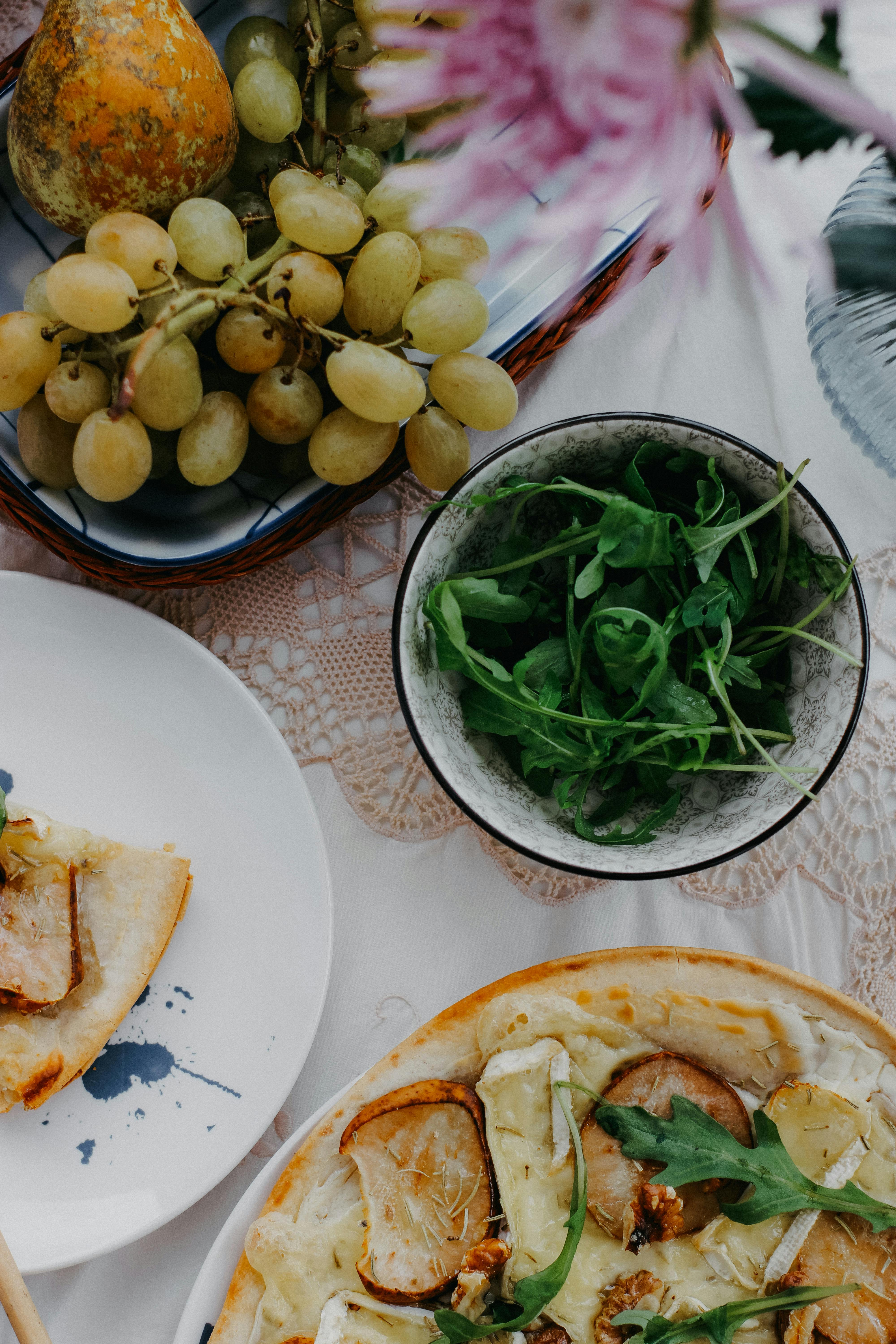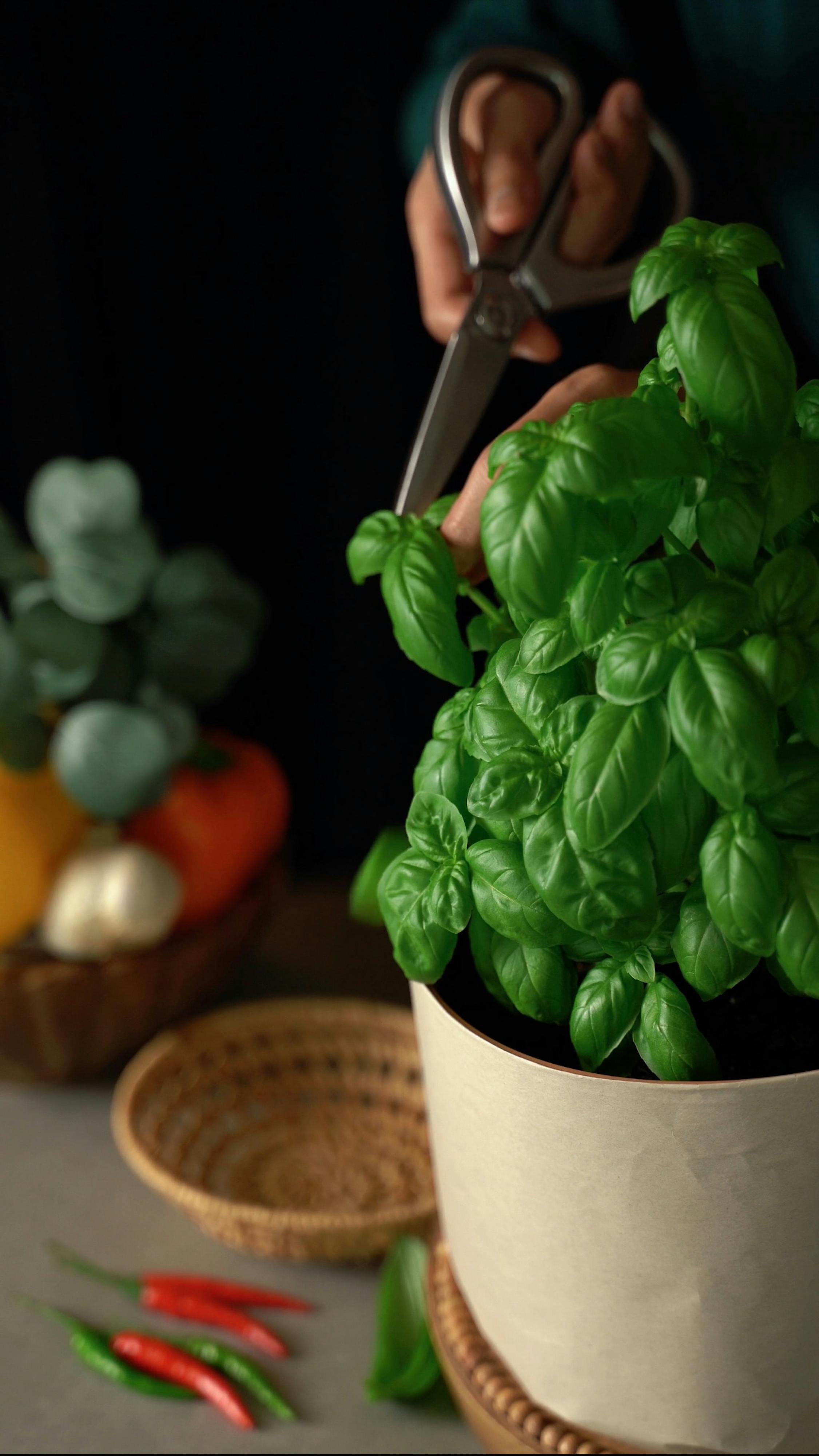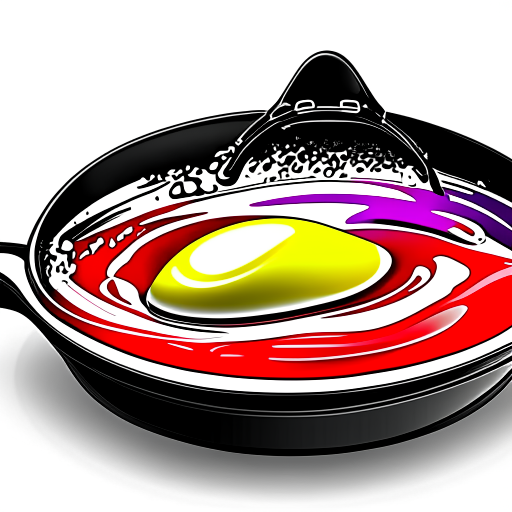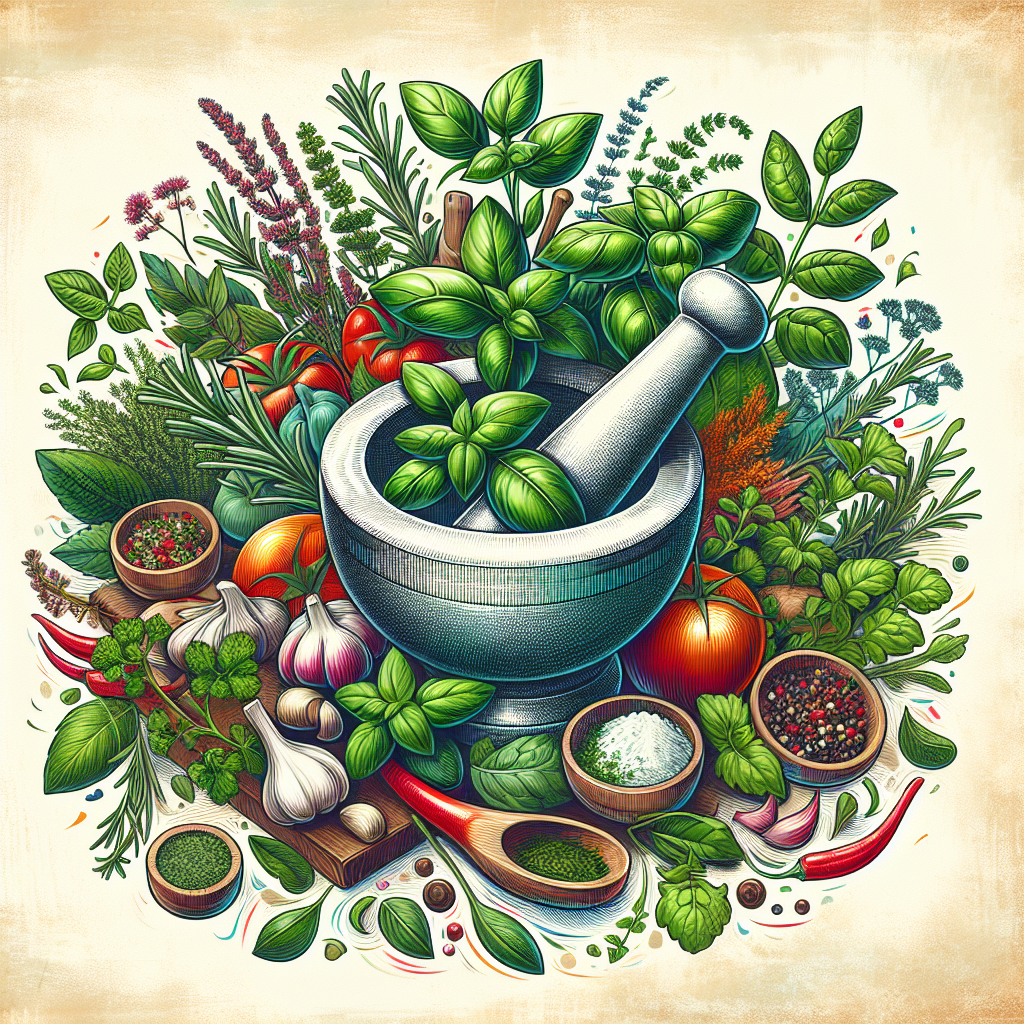Are you searching for a way to enhance the flavor of your meals while also nurturing your health? Look no further than Tastepan’s collection of nutritious and delicious recipes. With our expertise, we prioritize your well-being by providing wholesome meal ideas and dietary tips that make healthy eating a breeze. One of the secrets to creating tasty dishes that are also good for you lies in cooking with herbs. These culinary wonders not only add incredible flavor to your meals but also offer a range of health benefits. So, let’s explore the world of cooking with herbs for both flavor and health!

Choosing the Right Herbs
Understanding the different types of herbs
When it comes to cooking with herbs, it’s essential to understand the different types available. Herbs can be classified into three main categories: culinary herbs, medicinal herbs, and ornamental herbs. Culinary herbs, such as basil, thyme, and rosemary, are commonly used in cooking to enhance the flavor of dishes. Medicinal herbs, like chamomile and lavender, have properties that can benefit our health and wellness. Finally, ornamental herbs, such as lavender and mint, are often grown for their aesthetic appeal in gardens. By familiarizing yourself with these different types, you can choose the most suitable herbs for your culinary needs.
Considering the flavor profiles
Each herb has its unique flavor profile, which can greatly influence the taste of your dishes. For example, basil has a sweet and slightly peppery taste, while thyme has a more earthy and savory flavor. By understanding the flavor profiles of different herbs, you can better pair them with specific ingredients to create harmonious flavor combinations. Experimenting with different herbs will allow you to discover new and exciting taste sensations in your cooking.
Determining which herbs pair well with certain ingredients
Choosing the right herbs to complement your ingredients is crucial to achieving a well-balanced and delicious dish. Some classic herb and ingredient pairings include rosemary with lamb, dill with fish, and sage with poultry. The key is to consider the flavor profiles of both the herb and the main ingredient and determine which herbs will enhance the natural flavors of the dish. By exploring different combinations, you can unlock a world of culinary possibilities and create flavorful meals that are sure to impress.
The Health Benefits of Cooking with Herbs
Boosting antioxidants in your meals
Herbs are packed with antioxidants, which are compounds that help protect our bodies from damage caused by harmful free radicals. Adding herbs like oregano, thyme, and parsley to your meals can significantly increase the antioxidant content of your dishes. Antioxidants not only contribute to overall health but also have anti-aging properties and can support a strong immune system.
Reducing inflammation in the body
Chronic inflammation in the body can lead to various health issues, including heart disease, diabetes, and arthritis. Fortunately, many herbs have anti-inflammatory properties that can help combat inflammation naturally. Turmeric, ginger, and cinnamon are just a few examples of herbs that have been used for centuries to alleviate inflammatory conditions. By incorporating these herbs into your cooking, you can promote a healthier inflammatory response in your body.
Supporting digestion and gut health
Many herbs possess digestive properties that can help alleviate digestive issues such as bloating, indigestion, and gas. For example, peppermint is known for its ability to relieve stomach discomfort and nausea. Other herbs, like fennel and ginger, can help promote healthy digestion and soothe an upset stomach. By cooking with these herbs, you can support your gut health and enjoy a more comfortable digestive experience.
Boosting the immune system
Maintaining a strong immune system is essential for overall health and well-being. Certain herbs, such as garlic, rosemary, and echinacea, are known for their immune-boosting properties. These herbs can help strengthen your body’s defense mechanisms, making it more resilient to infections and illnesses. Incorporating these immune-boosting herbs into your meals can help fortify your immune system and keep you feeling your best.

Storing and Preserving Herbs
Properly washing and drying herbs
Before storing herbs, it’s essential to properly wash and dry them to remove any dirt or contaminants. Start by gently rinsing the herbs under cool running water and patting them dry with a clean kitchen towel or paper towels. To dry the herbs thoroughly, you can either air dry them or use a salad spinner to remove excess moisture. Properly washing and drying your herbs will help extend their shelf life and preserve their flavor.
Freezing herbs for later use
Freezing herbs is a simple and effective way to preserve their freshness and flavor for future use. To freeze herbs, start by washing and drying them thoroughly. Next, remove the leaves from the stems and chop them into small pieces. Place the chopped herbs into an ice cube tray and cover them with water or olive oil. Once frozen, transfer the herb cubes to a freezer-safe bag or container. When you need to use the herbs, simply thaw the desired amount and add them to your dishes.
Preserving herbs in oil or vinegar
Preserving herbs in oil or vinegar is another method to extend their shelf life and extract their flavors. Start by washing and drying the herbs as mentioned earlier. Remove the leaves from the stems and place them in a clean, sterilized jar. Fill the jar with oil or vinegar, making sure the herbs are completely submerged. Seal the jar tightly and store it in a cool, dark place. The herbs will infuse into the oil or vinegar over time, providing you with a flavorful ingredient for dressings, marinades, and sauces.
Cooking Techniques with Herbs
Using herbs in marinades and rubs
Incorporating herbs into marinades and rubs is an excellent way to infuse your meats and vegetables with flavor. Create a marinade by combining herbs, oil, acid (such as lemon juice or vinegar), and seasonings. Allow your ingredients to marinate for a few hours or overnight to maximize flavor. For dry rubs, mix together herbs, spices, and salt or sugar, then generously coat your proteins or veggies before grilling or roasting. The herbs will add depth and complexity to your dishes, elevating them to a new level of deliciousness.
Infusing oils and vinegars with herbs
Herb-infused oils and vinegars are versatile ingredients that can add a burst of flavor to a wide range of dishes. To infuse oils, heat the oil gently in a saucepan and add your chosen herbs. Allow them to steep for a few minutes, then strain out the herbs and transfer the infused oil to a bottle. For herb-infused vinegars, place the herbs in a sterilized jar, heat the vinegar until hot, then pour it over the herbs. Seal the jar tightly and let it sit for a few weeks to allow the flavors to meld. Use these infused oils and vinegars in dressings, dips, or drizzle them over roasted vegetables for a delightful taste.
Herb-infused butter and spreads
Herb-infused butter and spreads can instantly elevate the flavor of dishes such as bread, roasted vegetables, and grilled meats. To make herb-infused butter, soften unsalted butter and mix in finely chopped herbs, salt, and any other desired seasonings. Roll the butter into a log shape using plastic wrap and refrigerate until firm. Herb-infused spreads can be made by combining cream cheese, Greek yogurt, or sour cream with herbs, garlic, and lemon juice. These delicious additions will impress your guests and add a touch of gourmet flair to your meals.
Finishing dishes with fresh herbs
Fresh herbs can bring a burst of freshness and vibrant color to finished dishes. Just before serving, sprinkle or garnish your dishes with freshly chopped herbs. Whether it’s a sprinkle of cilantro on tacos, a scattering of basil on a caprese salad, or a scattering of dill on a creamy soup, the addition of fresh herbs will elevate your dishes to new heights. The delicate flavors and fragrances of fresh herbs will invigorate your taste buds and make your meals even more enjoyable.

Recipes with Herbs for Everyday Cooking
Herb-roasted chicken with lemon and thyme
Ingredients:
- 1 whole chicken
- 2 tablespoons olive oil
- 2 tablespoons fresh thyme leaves
- 1 lemon, sliced
- Salt and pepper to taste
Instructions:
- Preheat your oven to 425°F (220°C).
- Rinse the chicken and pat it dry with paper towels.
- Rub the chicken with olive oil, salt, pepper, and fresh thyme leaves.
- Place the lemon slices inside the chicken cavity.
- Tie the chicken legs together with kitchen twine and place it on a roasting pan or baking dish.
- Roast the chicken in the preheated oven for approximately 1 hour or until the internal temperature reaches 165°F (74°C).
- Let the chicken rest for a few minutes before carving. Serve with your favorite sides.
Pasta with fresh basil and cherry tomatoes
Ingredients:
- 8 ounces (225 grams) pasta of your choice
- 2 cups cherry tomatoes, halved
- 1/4 cup fresh basil leaves, torn
- 2 cloves garlic, minced
- 3 tablespoons olive oil
- Salt and pepper to taste
- Grated Parmesan cheese for serving
Instructions:
- Cook the pasta according to the package instructions until al dente. Drain and set aside.
- In a large sauté pan, heat the olive oil over medium heat.
- Add the garlic and cook for 1 minute until fragrant.
- Add the cherry tomatoes and cook for another 2-3 minutes until softened.
- Season with salt and pepper to taste.
- Add the cooked pasta and torn basil leaves to the sauté pan. Toss well to combine.
- Serve the pasta with grated Parmesan cheese on top.
Mediterranean herb-crusted fish
Ingredients:
- 4 white fish fillets (such as cod, haddock, or tilapia)
- 2 tablespoons fresh parsley, chopped
- 1 tablespoon fresh oregano, chopped
- 1 tablespoon fresh rosemary, chopped
- 2 cloves garlic, minced
- 2 tablespoons olive oil
- Salt and pepper to taste
- Lemon wedges for serving
Instructions:
- Preheat your oven to 400°F (200°C).
- In a small bowl, combine the chopped fresh herbs, minced garlic, olive oil, salt, and pepper.
- Pat the fish fillets dry with paper towels and place them on a baking sheet lined with parchment paper.
- Spread the herb mixture evenly over the fish fillets, pressing gently to adhere.
- Bake the fish in the preheated oven for approximately 12-15 minutes or until cooked through and flakes easily with a fork.
- Serve the herb-crusted fish with lemon wedges on the side.
Quinoa salad with cilantro and lime
Ingredients:
- 1 cup quinoa
- 2 cups water or vegetable broth
- 1 cup cherry tomatoes, halved
- 1 cucumber, diced
- 1 red bell pepper, diced
- 1/4 cup fresh cilantro, chopped
- Juice of 1 lime
- 2 tablespoons olive oil
- Salt and pepper to taste
Instructions:
- Rinse the quinoa thoroughly under cold running water.
- In a saucepan, bring the water or vegetable broth to a boil.
- Add the quinoa and reduce the heat to low. Cover and simmer for 15-20 minutes or until the quinoa is cooked and the liquid is absorbed.
- Remove the cooked quinoa from the heat and let it cool slightly.
- In a large bowl, combine the cooked quinoa, cherry tomatoes, cucumber, red bell pepper, fresh cilantro, lime juice, olive oil, salt, and pepper.
- Toss well to combine and adjust the seasoning if needed.
- Serve the quinoa salad as a refreshing side dish or as a light meal on its own.
Herbs for Specific Health Conditions
Herbs for promoting relaxation and reducing stress
If you’re looking for natural ways to promote relaxation and reduce stress, several herbs can help. Chamomile is well-known for its calming properties and is often consumed as a tea before bed. Lavender has a gentle, soothing scent that can help alleviate anxiety and promote relaxation. Lemon balm is another herb that has been used for centuries to ease tension and induce a sense of calm. Incorporating these herbs into your routine can provide a natural and gentle way to unwind and find tranquility.
Herbs for improving sleep quality
Getting a good night’s sleep is essential for overall well-being, and certain herbs can help promote sleep quality. Valerian root is a commonly used herb for improving sleep and can be consumed as a tea or in supplement form. Passionflower is another herb known for its calming effects and ability to enhance sleep. Additionally, chamomile and lavender, mentioned earlier for relaxation, can also be enjoyed as herbal teas to improve sleep quality. Experiment with different herbal teas and find the ones that work best for you.
Herbs for managing inflammation and pain
For individuals dealing with chronic inflammation and pain, certain herbs can provide natural relief. Turmeric, due to its active compound curcumin, has powerful anti-inflammatory properties. Ginger has been used for centuries as a natural remedy for pain and inflammation. Devil’s claw is an herb commonly used to manage arthritis pain. These herbs can be consumed as supplements, brewed as teas, or incorporated into your cooking to help manage inflammation and reduce pain. However, it’s essential to consult with a healthcare professional before introducing any new herbal remedies into your routine.
Growing Your Own Herb Garden
Choosing the right herbs for your garden
Growing your own herb garden is a rewarding and cost-effective way to have fresh herbs at your fingertips. When choosing herbs for your garden, consider your cooking preferences and the herbs that you use frequently. Popular culinary herbs such as basil, rosemary, thyme, and mint are excellent choices for beginners. Additionally, consider incorporating some medicinal herbs like chamomile, lavender, or peppermint for their health benefits. By selecting herbs that align with your culinary and wellness needs, you can create a garden that suits your preferences.
Providing the ideal growing conditions
To ensure the success of your herb garden, it’s crucial to provide the ideal growing conditions for your plants. Most herbs prefer a sunny location with at least six hours of direct sunlight per day. However, some herbs, such as mint and parsley, can tolerate partial shade. Good drainage is essential to prevent root rot, so make sure your herb garden has well-draining soil. Regular watering is necessary, but avoid overwatering, as herbs generally prefer slightly drier conditions. With the right balance of sunlight, water, and well-drained soil, your herb garden will flourish.
Harvesting and using your homegrown herbs
Harvesting herbs from your garden is a gratifying experience that allows you to enjoy the freshest flavors in your cooking. To harvest herbs, wait until the plants have grown enough to sustain regular harvests. Cut the stems with clean garden shears, leaving a few inches of growth on the plant to encourage additional growth. After harvesting, rinse the herbs with cool water and pat them dry with paper towels. Use the herbs immediately in your recipes, or store them in the refrigerator for up to a week. The joy of using homegrown herbs in your cooking is unmatched, so embrace the process and enjoy the rewards of your labor.
Cooking with Herbs in International Cuisines
Exploring the herb-centric dishes of Mediterranean cuisine
Mediterranean cuisine is renowned for its emphasis on fresh and flavorful ingredients, including a wide variety of herbs. Basil, oregano, rosemary, and thyme are staples in Mediterranean cooking and can be found in dishes like Caprese salad, Greek moussaka, and Italian marinara sauce. The combination of herbs, along with other Mediterranean flavors such as olive oil, garlic, and lemon, creates a vibrant and aromatic culinary experience. If you’re looking to explore herb-centric dishes, Mediterranean cuisine is a must-try.
Using herbs in Thai and Vietnamese recipes
Thai and Vietnamese cuisines use herbs in abundance to create dishes that are fragrant, flavorful, and refreshing. Herbs like cilantro, Thai basil, mint, and lemongrass are commonly used in dishes like Thai green curry, Vietnamese pho, and fresh spring rolls. The combination of herbs with spicy, sweet, and tangy flavors creates a harmonious balance that is a hallmark of these cuisines. If you enjoy vibrant and aromatic dishes, don’t miss the opportunity to experiment with Thai and Vietnamese recipes that showcase herbs in all their glory.
Incorporating spices and herbs in Indian cooking
Indian cuisine is known for its rich and complex flavors, which are often achieved through the skillful use of herbs and spices. Fresh herbs like coriander, mint, and curry leaves are essential components of many Indian dishes. Spices like turmeric, cumin, and cardamom are combined with these herbs to create curries, chutneys, and spice blends that are tantalizing to the taste buds. Exploring the world of Indian cooking will introduce you to a vast array of herbs and spices that can elevate your culinary repertoire.
Herbal Teas and Infusions for Wellness
Making herbal teas for relaxation and sleep
Herbal teas are a soothing and comforting way to promote relaxation and improve sleep quality. Chamomile tea is a popular choice for its calming properties and ability to alleviate anxiety and promote sleep. Lavender tea, with its gentle floral aroma, is another excellent option for relaxation and stress relief. Peppermint tea can help relieve indigestion and calm the stomach, contributing to a better night’s sleep. Sipping on a warm cup of herbal tea before bed can create a peaceful ritual that prepares your body and mind for a restful night’s sleep.
Creating detoxifying infusions with herbs
Herbs can also be used to create detoxifying infusions that support the body’s natural cleansing processes. Dandelion root tea is known for its liver-cleansing properties and can aid in detoxification. Nettle tea helps flush out toxins from the body and is rich in minerals and antioxidants. Lemon and ginger tea acts as a gentle detoxifier and aids digestion. Incorporating these herbal infusions into your wellness routine can support your body’s detoxification processes and contribute to a healthier and more balanced lifestyle.
Herbal teas for digestion and bloating
If you experience occasional digestive discomfort or bloating, certain herbs can help soothe and support your digestion. Peppermint tea is widely recognized for its ability to relieve bloating and ease digestive spasms. Ginger tea is another popular choice that can alleviate nausea, indigestion, and gas. Fennel tea has been used for centuries to aid digestion, reduce bloating, and soothe an upset stomach. These herbal teas can be enjoyed after meals or whenever you’re in need of digestive support. Sip on a cup of herbal tea, and your stomach will thank you.
Exploring Lesser-Known Herbs
Discovering the unique flavors of herbs like tarragon and lovage
While some herbs take the spotlight in the culinary world, others are lesser-known but equally delightful. Tarragon is an herb with a distinct anise-like flavor that complements fish, chicken, and egg dishes beautifully. Lovage is an herb that tastes similar to celery and can be used in soups, stews, and vegetable dishes. Adding these lesser-known herbs to your cooking repertoire will allow you to experiment with new and exciting flavors, adding depth and complexity to your dishes.
Exploring the medicinal properties of herbs like fenugreek and echinacea
In addition to their culinary uses, many herbs possess medicinal properties that have been valued for centuries. Fenugreek is an herb known to promote milk production in breastfeeding mothers and support healthy blood sugar levels. Echinacea is a popular herb used to boost the immune system and reduce the duration of the common cold. By exploring the medicinal properties of herbs like fenugreek and echinacea, you can discover natural remedies that have the potential to enhance your well-being.
Enhancing dishes with lesser-known herbs for a unique twist
Incorporating lesser-known herbs into your cooking can provide a unique twist to familiar dishes. Lemon verbena, with its lemony fragrance, can elevate desserts, teas, and marinades, while marjoram adds a delicate floral note to soups, sauces, and roasted vegetables. Purslane is an herb often used in Mediterranean cuisine and can be enjoyed in salads, stir-fries, and soups. By venturing beyond the popular herbs, you can expand your culinary horizons and create dishes that are truly memorable.
Cooking with herbs not only enhances the flavor of your dishes but also provides a myriad of health benefits. From adding antioxidants and reducing inflammation to supporting digestion and boosting the immune system, herbs offer a natural and flavorful way to improve your well-being.
Properly storing and preserving herbs allows you to enjoy their freshness long after they have been harvested. Whether you freeze them for later use or preserve them in oil or vinegar, these techniques ensure that your herbs retain their flavor and can be easily incorporated into your recipes.
When it comes to cooking with herbs, there are various techniques you can employ. From using herbs in marinades and rubs to infusing oils and vinegars, these methods infuse dishes with the irresistible aromas and tastes of herbs. Herb-infused butter and spreads can instantly enhance the flavors of your favorite foods, while finishing dishes with fresh herbs adds a vibrant touch.
To inspire your culinary adventures, we have provided four recipes that showcase the versatility of herbs. From herb-roasted chicken with lemon and thyme to a refreshing quinoa salad with cilantro and lime, these recipes incorporate herbs in creative and delicious ways.
Furthermore, herbs can be tailored to specific health conditions. Whether you’re looking to promote relaxation, improve sleep quality, or manage inflammation and pain, there are herbs that can support your well-being naturally.
The joy of growing your own herb garden cannot be overstated. By selecting the right herbs, providing ideal growing conditions, and harvesting them at the right time, you can experience the satisfaction of using homegrown herbs in your cooking.
Incorporating herbs into international cuisines opens up a world of flavors and culinary traditions. From the herb-centric dishes of Mediterranean cuisine to the aromatic usage in Thai, Vietnamese, and Indian cooking, herbs are celebrated for their ability to enhance the taste and aroma of dishes.
Herbal teas and infusions offer an array of wellness benefits. Whether you’re looking to relax, detoxify your body, or aid digestion, there are herbal teas suitable for every need.
Lastly, exploring lesser-known herbs allows you to embark on a culinary journey filled with surprises and unique flavors. Tarragon, lovage, fenugreek, echinacea, and other lesser-known herbs can add a distinctive twist to your dishes and take your cooking to new heights.
Incorporating herbs into your cooking is an enjoyable and health-promoting endeavor. Whether you’re a novice or an experienced home cook, exploring the world of herbs can lead to exciting culinary experiences and elevate the overall quality of your meals. So, don’t hesitate to experiment, discover new flavors, and prioritize your well-being by cooking with herbs.

